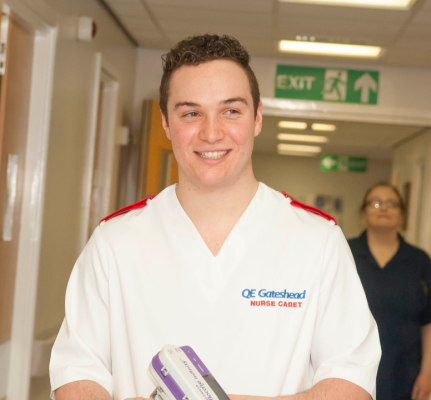Healthcare assistant
Healthcare assistants make sure the patient experience is as comfortable and stress-free as possible. It can also be the stepping stone into many other NHS roles.
Working life
You'll work under the guidance of a healthcare professional such as a nurse and your job will vary depending on where you're based. For example, in a hospital you may:
- wash and dress patients
- serve meals and help to feed patients
- help people to move around
- make beds
- make patients feel comfortable
- monitor patients' conditions by taking temperatures, pulse, respirations and weight
In a health centres and GP surgery, you may
- sterilise equipment
- do health checks
- restock consulting rooms
- process lab samples
- take blood samples
- do health promotion or health education work
As well as nurses, HCAs work with doctors, midwives and other healthcare professionals. They have a lot of contact with patients.
Luke Watson
Nurse cadet
Read Luke's storyThe thing I enjoy most is providing individual patient care. Having a direct influence on a person’s health is very fulfilling and I love watching a person progress and improve from admission to discharge.

Entry requirements
There are no set entry requirements to become a healthcare assistant. Employers expect good literacy and numeracy and may ask for GCSEs (or equivalent) in English and maths. They may ask for a healthcare qualification, such as BTEC or NVQ.
Employers expect you to have some experience of healthcare or care work. This could be from paid or voluntary work. There are sometimes apprenticeships in healthcare that can give you experience to apply for HCA posts.
If you're applying for a role in the NHS, you'll be asked to show how you think the NHS values apply in your everyday work.
Skills and personal characteristics needed
To be a healthcare assistant, you'll need to be
- caring and kind
- cheerful and friendly
- willing to be hands-on with patients
- willing to do personal care tasks (washing, toileting, etc)
- able to follow instructions and procedures
- able to work in a team but use their own initiative
You'll also need
- communication skills, including listening
- organisation skills
- observational skills
Training and development
Your training as a healthcare assistant will include basic nursing skills and you'll work towards the Care Certificate, developed by Skills for Care, Skills for Health and Health Education England and launched in 2015.
Find out more about the Care Certificate
You may also be offered the chance to study for qualifications through an apprenticeships such as:
- the NCFE CACHE level 2 Certificate in Healthcare Support Services
- the NCFE CACHE level 3 Diploma in Healthcare Support
With experience and further training, you could become a senior healthcare assistant. You could then apply to train as an assistant practitioner or nursing associate. With the appropriate qualifications/evidence of academic ability, you could also train as one of the many degree-level healthcare professionals such as a nurse, podiatrist, midwife or occupational therapist.
Pay and benefits
Your standard working week will be around 37.5 hours and may include a mix of shifts, such as nights, early starts, evenings and weekends. As a healthcare assistant, you’ll be paid on the Agenda for Change (AFC) pay system, typically starting on band 2.
You’ll also have access to our generous pension scheme and health service discounts, as well as 27 days of annual leave, plus bank holidays, which increases the longer you’re in service.




